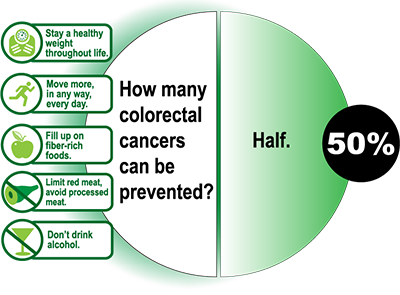A new study that adds to the evidence on diet and colorectal cancer suggests that vegetarians have a lower risk of this cancer than non-vegetarians, with fish-eaters — pescovegetarians — showing the lowest risk of the non-meat eating groups. 
The study was published yesterday in JAMA Internal Medicine and it will be a part of AICR/WCRF’s ongoing collection of the worldwide research. The latest AICR/WCRF report on colorectal cancer concluded that diets high in red meat increase the risk of colorectal cancer.
The study collected the eating and other lifestyle habits of almost 78,000 Seventh-Day Adventists, a group that traditionally advocates vegetarian and healthy eating. Researchers categorized the group into those who ate meat regularly and four vegetarian patterns: 1) ate fish regularly; 2) ate milk and eggs regularly 3) ate small amounts of meats and fish; and 4) ate no meats, dairy or any animal food (vegans).
Overall, vegetarians had lower BMI, ate less fat, red meat, and processed meat, and ate more fiber.
Slightly more than half the study population was categorized as vegetarians. Over 7 years, there were 490 cases of colorectal cancer.
All vegetarians combined had approximately 20 percent lower risk than non-vegetarians. This is after accounting for other risk factors, such as age, BMI, drinking alcohol and exercise habits. Pescotarians showed the most benefit, with no extra reduced risk for vegans.
Study limitations the authors note include relatively few years of follow-up and participants only reporting their dietary habits at the start.
Although eating less meat may be a primary reason for the reduced risk seen in vegetarians, eating more plant foods might also play a role, conclude the authors. Even the non-vegetarians in this population were eating less meat than the average American, they write.
This study adds to a body of research that overall shows poultry and small amounts of red meat do not increase colorectal cancer risk. Back in 2009, for example, a large population study in Britain found that being vegetarian did not decrease colorectal cancer risk.
AICR/WCRF’s analysis of the global research concludes that colorectal cancer risk decreases with physical activity, foods containing fiber, and diets high in garlic and calcium; risk increases with overweight and obesity, alcohol, processed meats, and high amounts of red meat. AICR estimates that half of colorectal cancers are preventable through changes in diet, weight, and physical activity.
Read Learn about Colorectal Cancer for the current findings on reducing risk.
The study was funded by the National Cancer Institute and World Cancer Research Fund (WCRF)






.Dr. Michael J. Orlich, MD, PhD
Program Director, Preventive Medicine Residency
Loma Linda University
Co-Investigator, Adventist Health Studies discussed his study in an interview on MedicalResearch.com
http://medicalresearch.com/cancer-_-oncology/colon-cancer/healthy-vegetarian-diet-may-reduce-risk-of-colon-cancer/12464/